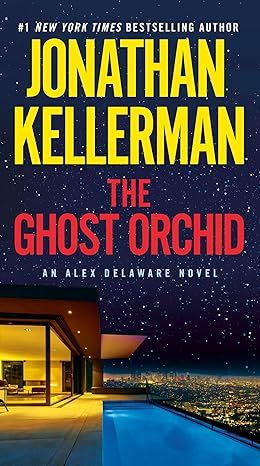The Ghost Orchid: An Alex Delaware Novel
4.5
-
9,470 ratings
NEW YORK TIMES BESTSELLER • Psychologist Alex Delaware and Detective Milo Sturgis confront a baffling, vicious double homicide that leads them to long-buried secrets worth killing for in the riveting thriller from the #1 New York Times bestselling “master of suspense” (Los Angeles Times).
LAPD homicide lieutenant Milo Sturgis sees it all the time: Reinvention’s a way of life in a city fueled by fantasy. But try as you might to erase the person you once were, there are those who will never forget the past . . . and who can still find you.
A pool boy enters a secluded Bel Air property and discovers two bodies floating in the bright blue water: Gio Aggiunta, the playboy heir to an Italian shoe empire, and a gorgeous, even wealthier neighbor named Meagin March. A married neighbor.
An illicit affair stoking rage is a perfect motive. But a “double” in this neighborhood of gated estates isn’t something you see every day. The house is untouched. No forced entry, no forensic evidence. The case has “that feeling,” and when that happens, Milo turns to his friend, the brilliant psychologist Alex Delaware.
As Milo and Alex investigate both victims, they discover two troubled pasts. And as they dig deeper, Meagin March’s very identity begins to blur. Who was this glamorous but conflicted woman? Did her past catch up to her? Or did Gio’s family connections create a threat spanning two continents?
Chasing down the answers leads Alex and Milo on an exploration of L.A.’s darkest side as they contend with one of the most shocking cases of their careers and learn that that some secrets are best left buried in the past.
Kindle
$2.99
Available instantly
Audiobook
$0.00
with membership trial
Hardcover
$16.99
Paperback
$9.99
Ships from
Amazon.com
Payment
Secure transaction
ISBN-10
0593598946
ISBN-13
978-0593598948
Print length
352 pages
Language
English
Publisher
Ballantine Books
Publication date
November 25, 2024
Dimensions
4.19 x 0.78 x 7.5 inches
Item weight
6.8 ounces
Popular Highlights in this book
That thing was genocide. A million Armenians slaughtered by the Ottomans less than thirty years before the Holocaust. The world doing nothing, giving Hitler confidence.
Highlighted by 59 Kindle readers
State of Texas picture identification card issued to Persephone Sue Gilmore, age eighteen.
Highlighted by 50 Kindle readers
Product details
ASIN :
B0C4JBJBFG
File size :
2390 KB
Text-to-speech :
Enabled
Screen reader :
Supported
Enhanced typesetting :
Enabled
X-Ray :
Enabled
Word wise :
Enabled
Editorial Reviews
“[Jonathan] Kellerman delivers clever twists alongside the lived-in banter between his leads that sets this series apart. It’s both a treat for longtime fans and a great entry point for newcomers.”—Publishers Weekly
“Kellerman continues to surprise and shock us.”—Booklist
“Like all the Alex Delaware novels, this one is fast-moving fun.”—Kirkus Reviews
“Jonathan Kellerman has created one of the most enduring and acclaimed series in suspense fiction. . . . [His] prose is fast-paced without being in any way hurried or abrupt, and Delaware and Sturgis play off one another exceptionally well. The characters are as comfortable as old slippers, fictional friends whose company and adventures readers have enjoyed for decades. The Ghost Orchid is another excellent addition to a series full of excellent editions.”—BookPage
Sample
Chapter 1
Nearly getting killed can change your life in interesting ways.
There’s the physical healing, but that’s tedious to think about. What fascinates me is how people behave when they know you’ve come close to death.
Some you haven’t heard from in a while get in touch out of obligation. Most of the time they have no idea what to say or do and you end up assuring them you’re fine and trying to make them feel better. Or maybe that was just me, reverting to the psychologist’s role.
I’m close to only two people on the planet.
The woman I live with handled the whole thing beautifully, pulling off the perfect balance of caring for me and allowing me space when I needed it. Even more impressively, when Robin allowed herself to get angry at me for being in danger in the first place, she was able to talk about it reasonably.
My best friend, a homicide detective, was overcome with guilt. I’d been working with Milo when a lunatic nearly crushed me to death. No one’s fault, reasonable precautions had been taken. Just one of those things that happen. But, still.
He’d worked hard at keeping the guilt in check but I could tell. Our conversations began ebbing into long silences, terminating when he told me I needed to rest.
Eventually, his visits tapered off, though he tried to keep up with regular phone calls. But he avoided talking about work, which peppered the calls with awkward silences.
Worst of all, he stopped calling me in on cases. The “different ones” where he tends to overestimate my talent. When I brought up the subject, he claimed the two new murders he’d taken on were open and shut.
Four months after being injured I sat with Robin on the second-story terrace that fronts our house, eating and drinking and enjoying the weather that keeps people in L.A., and said, “Still nothing from Big Guy.”
She said, “Can you blame him?”
“I think he’s overdoing it. Objectively, he did nothing wrong.”
“Who’s ever objective, Alex?”
I poured myself another finger of Chivas—the pricey gold stuff I’d never buy for myself. A guilt offering from Milo.
Neither of us talked for a while and I resumed rubbing the big, knobby head of our little blond French bulldog, Blanche. She’s also been perfect. Sitting next to me as I knitted, silent and patient, careful not to touch the torn muscles in my chest. She’s always been a wonderful companion, intuitive, perceptive, more keyed in to nonverbal cues than any human could hope to be. But this was more. She knew something was different and she cared.
Robin said, “All those custody cases came in but you’re still bored.”
“I could use some variety.”
“Know what you mean.”
That surprised me.
She said, “Why do you think I do what I do, baby? Every instrument’s different, it’s not like I’m making the same armchair over and over.”
I said, “So you wouldn’t mind if I diversified. Maybe got into macramé?”
She grinned and placed her small, strong hand over mine. Her hair’s thick, auburn, and curly and when she’s not in her studio, she wears it loose to the midpoint of her back. Tonight, the moon was medium strength and it gilded all those curls and limned her oval face, her pointy chin. The slightly oversized milk-white incisors that had attracted me in the first place.
“Would I prefer if you never got involved in all the ugly stuff? Part of me would. But I’d be living with a very unhappy man.”
“Unhappy fool.”
She laughed. “Don’t tempt me. Anyway, I’m sure he’ll call when he really needs you.”
“I’m not.”
She poured herself another half glass of Zinfandel. Daintily polished off a stuffed grape leaf. Greek takeout, tonight. Blanche had scored bits of rice and lamb. Everyone happy.
Except me. I’d been faking serenity for a while, had never stopped feeling incomplete.
It took another two weeks for that to finally change.
Chapter 2
The call came in at nine a.m. on a glorious Sunday. The familiar voice, tight with battle readiness but tinged with uncertainty.
“Too early for you?”
“No, been up for a while.”
“How you feeling?”
“Great.”
“Well . . . I’ve got one, been here since seven thirty, I figured maybe . . .”
“Sure.”
“Also,” he said, “not far from you. If you’re feeling up for it. Back in the old days you probably coulda run over here.”
I said, “Give me the address.”
The trip was four point eight miles from my house in Beverly Glen. A feasible run B.C.—before crushing—but even then I’d have driven because I like to get to scenes fast.
I wheeled the Seville down the nameless former bridle path that winds down treacherously from our half acre, drove south on Beverly Glen past the skinny chockablock houses that line the road in our neighborhood, and transitioned to the grand estates just north of Sunset Boulevard.
At Sunset I hooked right and continued to the western gate of Bel Air, sped up Bellagio Road before turning onto a series of serpentine side streets. Reversing the process: eight-figure palaces followed by progressively more modest houses on limited woodsy lots.
Every crime scene’s unique but there’s also a sameness to them. The procedures, the activities of those who’ve chosen to work with worst-case scenarios. The emotional tone.
The first thing you see is what I’ve come to think of as Death’s Parking Lot: detectives’ unmarked sedans, patrol cruisers, crypt vans, hybrid compacts driven by coroner’s investigators.
Behind all that, the inevitable yellow tape. Canary-bright and sadder for that.
This was my first crime scene in four-plus months and simply arriving tweaked my brain and made me feel alive. No point wondering what that said about me. I was imagining, wondering, lasering the layout.
This lot was so thickly wooded that no structure was visible from the street. To the right of the vehicles, a burly young officer stood guard. The foliage hid neighboring properties, as well, creating an illusion of forest.
Cruelly peaceful.
Usually, Milo informs the cops that I’m coming and they lift up the yellow strand. Sometimes they even smile and welcome me by name.
This time I had to show my I.D. to Burly, who looked to be allergic to smiling.
He examined my driver’s license as if it were written in hieroglyphics, re-read, checked me out squint-eyed, stepped away and made a call. Returning, he favored me with a lemon-sucking frown, said, “Okay,” reluctantly, and left me to lift my own damn tape.
Trying not to read too much into any of it, I ducked under and picked up my pace, ignoring the twinges in my ribs that followed each footfall.
Aiming myself toward the old days.
The forest turned out to be little more than a poorly trimmed amalgam of ficus and eugenia backed by huge, shaggy silver dollar eucalyptus. Decades ago, a plague had killed off most of the eugenia hedges in Southern California but a few survivors remain. The ficus tack-on said someone had settled for a quick fix in lieu of re-landscaping.
Getting past the greenery landed me in front of a small, flat lawn fronting a one-story, cedar-sided ranch house.
In a suburban setting, another dated sixties throwback. In Bel Air, five million bucks if you hired the right real estate agent.
A second tape barrier ran across the front door. A black Maserati convertible sat in a gravel driveway to the left of the house. Newer model, the name of a Beverly Hills dealer framing the license plate. Littered with dust and leaves. Tennis racquet and balls on the passenger seat.
When the driveway reached the house, it converted to concrete and continued, ungated, toward the rear of the property.
The only feasible entry this morning. I walked along the house. Thought about easy access to a killer.
No sign of Milo or anyone else until I reached the end of the drive and turned right and there he was along with a pair of techs, a C.I., and half a dozen uniforms with nothing to do but look official.
Milo looked the same; why wouldn’t he? Tall, mastiff-jowled, top-heavy above oddly thin legs, he wore wrinkled khakis, pink-soled desert boots, a spinach-green sport coat, a white wash ’n’ wear shirt with a defeated collar, and a skinny black tie patterned with something hard to make out.
Sunlight waged a full-on assault on his pale, pocked face, having its way with every pit and lump. His black hair, slicked down hours ago, had rebelled and bristled. A limp flap in front diagonaled a brow the texture of cottage cheese.
He was on his phone, saw me and nodded. Grimly, I thought. But maybe not. Who cared, anyway? He’d called. Time to focus and not get sidetracked.
I got close enough to see the tie pattern. Goose heads. Rows of beaks pointing to the right. He clicked off and said, “Thanks for coming.”
Read more
About the authors
Jonathan Kellerman
Jonathan Kellerman is the #1 New York Times bestselling author of more than three dozen bestselling crime novels, including the Alex Delaware series, The Butcher’s Theater, Billy Straight, The Conspiracy Club, Twisted, True Detectives, and The Murderer’s Daughter. With his wife, bestselling novelist Faye Kellerman, he co-authored Double Homicide and Capital Crimes. With his son, bestselling novelist Jesse Kellerman, he co-authored The Golem of Hollywood and The Golem of Paris. He is also the author of two children’s books and numerous nonfiction works, including Savage Spawn: Reflections on Violent Children and With Strings Attached: The Art and Beauty of Vintage Guitars. He has won the Goldwyn, Edgar, and Anthony awards and has been nominated for a Shamus Award. Jonathan and Faye Kellerman live in California, New Mexico, and New York.
Read more
Reviews
Customer reviews
4.5 out of 5
9,470 global ratings
LEAH ESTRIN
5
worth your time
Reviewed in the United States on August 6, 2024
Verified Purchase
Great read. Keeps you involved and questioning all. And a nice resolution to the issues that the story created. Worth your time!
Benefits Babe
5
Another amazing episode
Reviewed in the United States on August 14, 2024
Verified Purchase
As usual Mr Kellerman has brought us into a gripping drama punctuated by a few laughs and the Easter Egg of referencing his own book on troubled children. For decades I have read and loved Alex and always will. I love Milo. I love Robin. I love the glimpses into their world and relationships. A fabulous read that always ends too soon.
Allen Duhe
5
Alex Delaware Never Fails To Deliver
Reviewed in the United States on August 4, 2024
Verified Purchase
As always, Jonathan Kellerman’s novel moved quickly, kept me engaged, and ended on a high note.
Milo, the heavyset, determined detective once again engages his best buddy, Dr. Alex Delaware, to help solve some murders. Not just one, in this case, but two at the outset, which devolved into several bodies piling up before the novel ended. But all delivered without a lot of blood and gore, no sex, little cussing - in all, a good, clean, rather polite, fast-paced murder mystery. Throw in a crazy killer, a ton of money, a child neither of his parents wants, and you’re in for a good read.
Read more
4 people found this helpful
Susan M. Baumann
5
Sharp, intelligent and Compelling
Reviewed in the United States on February 19, 2024
Verified Purchase
I always enjoy Jonathan Kellerman’s books. Each is reliably entertaining and well-written, with smooth pacing that never lags. Kellerman is particularly skilled at writing character dialogue and can spin a story into an intricate and intriguing mystery. My favorite thing about the Alex Delaware series however, is the genuine and enduring relationship dynamic between Alex, Robin and Milo. Returning to these familiar characters is like a long overdue conversation with really good friends. In this latest book, we find Detective Milo Sturgis at the scene of a double murder in Bel Air, CA. Both victims have been shot through the heart. Meagin and Gio were lovers. They had wealth, privilege and were afforded the privacy of Gio’s lush, secluded backyard, safely hidden from view. Yet, both are now dead, and Milo is tasked with notifying Meagin’s husband, Doug, a businessman preoccupied with real estate acquisitions. Before making that call however, Milo contacts Alex, and they survey the crime scene. For readers new to the series, Alex is a psychologist. He specializes in child custody cases, but offers Milo his knowledge and insight regarding the psychology of human behavior. The two friends consult frequently, and Alex’s expertise has been invaluable to the LAPD in solving some of their toughest homicides. Finding nothing unusual and retrieving what little evidence there is, both men then proceed to the March residence to inform Doug of his wife’s untimely death. Subsequently, what follows, is an exhaustive deep-dive into the lives of the deceased, the potential suspects and the various leads to track down. First, they must determine who was the primary target. Was it Giovanni Aggiunta, the mildly successful Italian playboy, indulged by his family? Perhaps he had potential enemies across two continents. Maybe the main target was Meagin March, the pampered, but ignored, wife of a young, Uber-rich entrepreneur? Meagin had an erratic, troubled past, and many secrets she tried to outrun. Like all of Kellerman’s books, I marveled at the sheer number of characters that were created in order to construct a believable crime story and the corresponding police investigation. Each strand of the narrative unspools gradually. By combing databases, researching possible tangential connections and the legwork needed for interviews and interrogations, Milo and Alex begin to uncover the darkness that lurks just below the surface. Kellerman is a confident writer, and the plot unfolds with a deft touch. You won’t find a misstep or a stone left unturned. Intelligent and compellng crime fiction that checks all the boxes and provides everything that Kellerman fans have come to expect. “The Ghost Orchid” is a police procedural detective story with many layers and multiple characters. As an aside, I particularly liked the character of Derek, a clear-eyed, wise teen embroiled in his own custody case. It’s a minor subplot, unrelated to the murder investigation, but still poignant and endearing. “The Ghost Orchid” is a satisfying read. It offers a chance to revisit some longtime favorite characters and explores how past trauma can continually inform the present without sufficient professional help and intervention. I would highly recommend this one.
Read more
24 people found this helpful
Richard B. Schwartz
5
This is quite different from most of the JK stories.
Reviewed in the United States on February 11, 2024
Verified Purchase
This is different from most of the Alex Delaware novels. It is a little shorter and it is far more linear. What do I mean by that? Bob Parker used to say that much crime fiction involved going door to door and asking questions. When the questions are answered the book is finished. The alternative is a story with multiple plots, multiple characters, obfuscation, blind alleys, mystification, tricks, puzzles and, ultimately, resolution. THE GHOST ORCHID is, on the other hand, a very straightforward story. A man and a woman (married to another man) are found by his pool in Bel Air. Both are shot through the heart. The novel basically asks the question, who are these people? When the questions are finally answered the story ends.
There is a single subplot and it appears to be there for simple relief from the main plot. Alex is asked to handle a custody case in which neither parent has great interest in securing the custody of their adopted son. As it turns out (mini-SPOILER) the custody case illuminates the themes that arise from the primary investigation.
The final resolution(s) are brief and to the point. There is no slam-bang conclusion that occupies a fourth to a fifth of the pages (common in JK’s Alex Delaware novels). The fact that the plot architectonics are simple and clear does not suggest that the book lacks urgency or even intensity. The writing is excellent. All of the elements of great fiction (character, plot, setting, theme) are there. It is just more linear and different from the average JK story. (And the title, when it is finally explained, is absolutely superb, unlike some of the JK titles, which can range from excellent to perfunctory.)
Enjoy. Five stars.
Read more
13 people found this helpful
Top Jonathan Kellerman titles
View all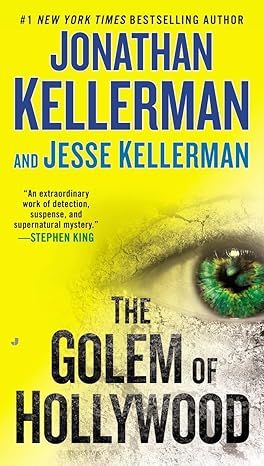
The Golem of Hollywood (A Detective Jacob Lev Novel)
3.3
-
2,513
$2.00
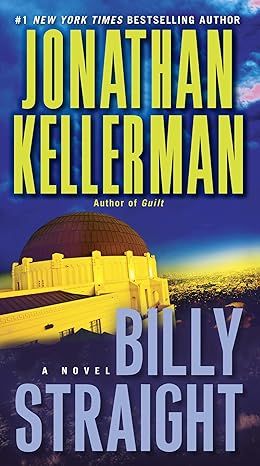
Billy Straight
4.6
-
1,766
$0.50
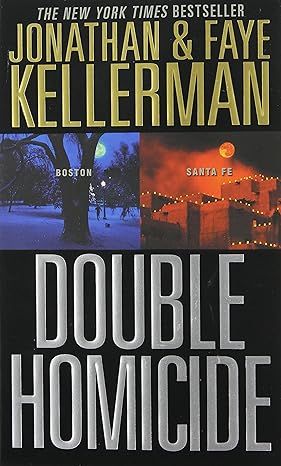
Double Homicide
4.1
-
1,297
$1.82
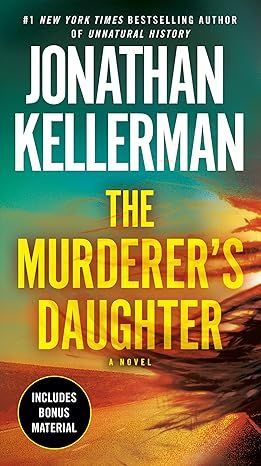
The Murderer's Daughter: A Novel
3.9
-
6,872
$1.74
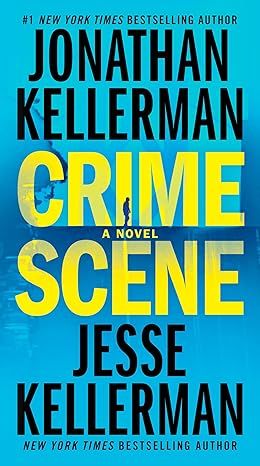
Crime Scene: A Novel (Clay Edison)
4.1
-
5,842
$9.99
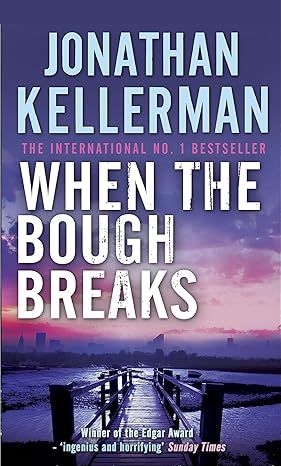
When the Bough Breaks (Alex Delaware series, Book 1): A tensely suspenseful psychological crime novel
4.3
-
4,786
$9.99
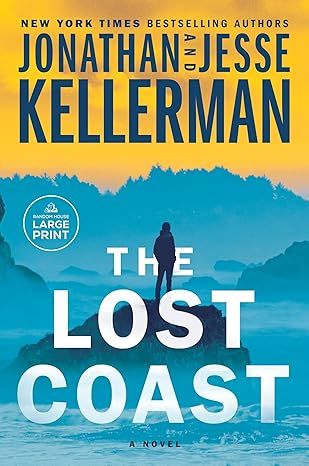
The Lost Coast: A Novel (Clay Edison)
4.4
-
802
$14.99
Best Sellers
View all
The Tuscan Child
4.2
-
100,022
$8.39

The Thursday Murder Club: A Novel (A Thursday Murder Club Mystery)
4.3
-
155,575
$6.33

Sapiens: A Brief History of Humankind
4.6
-
140,302
$13.49

The Butterfly Garden (The Collector, 1)
4.3
-
88,556
$9.59

Things We Hide from the Light (Knockemout Series, 2)
4.4
-
94,890
$11.66

The Last Thing He Told Me: A Novel
4.3
-
154,085
$2.99

The Perfect Marriage: A Completely Gripping Psychological Suspense
4.3
-
143,196
$9.47

The Coworker
4.1
-
80,003
$13.48

First Lie Wins: A Novel (Random House Large Print)
4.3
-
54,062
$14.99

Mile High (Windy City Series Book 1)
4.4
-
59,745
$16.19

Layla
4.2
-
107,613
$8.99

The Locked Door
4.4
-
94,673
$8.53
